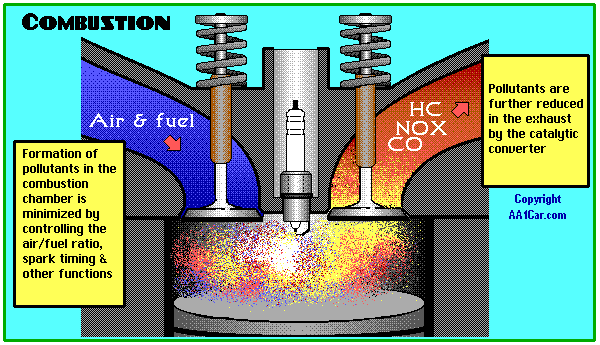
Home, Auto Repair Library, Auto Parts, Accessories, Tools, Manuals & Books, Car BLOG, Links, Index

What Every Motorist Should Know About Gasoline Octane Ratings & Recommendations
Copyright AA1Car.com


Copyright AA1Car.com
The term OCTANE refers to a fuel's ability to resist spark knock or detonation. The chemical properties of the fuel determine its combustion characteristics - the temperature and pressure at which it ignites and how quickly it burns. Higher octane fuels can withstand higher temperatures and pressures, and typically burn somewhat slower than lower octane fuels.
The least amount that's necessary to prevent detonation (spark knock). On most vehicles, that would be regular unleaded 87 octane gasoline. But on higher compression engines, or turbocharged or supercharged engines, the engine may require premium grade 91 to 93 octane fuel.
Detonation (also called spark knock) occurs when the octane rating of the fuel isn't high enough to handle the heat and pressure. Detonation is most noticeable when lugging the engine under load or accelerating. It may should like a pinging, clattering or rattling noise. Instead of a single flame front forming when the fuel is ignited, multiple flame front form spontaneously throughout the combustion chamber. These collide and produce shock waves that cause the noise. The hammer-like blows produced by detonation are very hard on the pistons, head gasket and bearings and may damage the engine if the problem is not corrected.
Other common causes of detonation (besides low octane gasoline) include: a faulty Exhaust Gas Recirculation (EGR) system, too much compression due to a build up of carbon deposits in the combustion chambers (use a top cleaner to clean the combustion chambers), a lean fuel condition (dirty fuel injectors), or engine overheating.
Most late model engines have a "knock" sensor to detect engine vibrations caused by detonation. When the sensor detects detonation, it signals the PCM to temporarily retard spark timing. This helps protect the engine from possible detonation damage, but it also reduces engine performance and fuel economy.
One way to prevent detonation is to use a higher octane fuel. The octane rating of a motor fuel is a measure of its detonation resistance. The octane number posted on the filling station pump is "pump octane," which is an average of something called "research" and "motor" octane ratings (which are two different laboratory methods of measuring octane). The higher the pump octane number, the better able the fuel is to resist detonation.

A gasoline's octane rating depends on the blend of hydrocarbons in the fuel and other ingredients that are added to it. Tetraethyl lead was long used as an anti-knock additive to improve gasoline octane. In fact, it was the most effective and least expensive octane-boosting additive that could be used for this purpose. But leaded fuel cannot be used in a vehicle with a catalytic converter because the lead fouls the catalyst. So unleaded fuels in the U.S. were phased out back in the early 1980s.
Most regular unleaded gasoline today are rated at 87 octane (or less in higher altitude locales), which is sufficient for engines with compression ratios of up to about 9 to 1, and up to 10 to 1 compression on some newer engines. Higher compression engines, engines with turbochargers or superchargers, or ones used frequently for towing usually require a higher octane premium grade of gasoline (91 octane).
CAUTION: Follow the fuel recommendations in your vehicle owner's manual. If your vehicle requires premium 91 or higher octane fuel, use a premium grade of gasoline.
What happens if you use a lower grade fuel in an engine that requires premium fuel?
Most late model engines will compensate for the reduced octane by retarding spark timing. The engine's knock sensor will detect any detonation that may be occurring when the engine is accelerating or working hard and the engine computer will retard ignition timing. This will prevent damage to the engine but it will also reduce power and fuel economy somewhat. Even so, you can often get by using a lower octane fuel to save money as long as you go easy on the throttle and are not driving hard, towing a trailer or making the engine lug.
If you can't find pump gas with a high enough octane to prevent detonation, you can always add an aftermarket octane boosting fuel additive to your fuel tank. Such products contain MBTE, alcohol or other ingredients that boost the octane rating of ordinary pump gas several points depending on the concentration used (always follow directions).
But even this might not be enough to eliminate a persistent spark knock if your engine has an underlying problem such as a defective EGR system, poor coolant circulation, exhaust restriction or carbon buildup in the combustion chambers.
Short of a laboratory test, there's no simple way to tell if a gasoline retailer is cheating their customers by selling fuel that fails to meet the octane number posted on the pump. Higher octane fuel costs more to refine so it is more expensive than lower octane fuel. The price difference can be 20 to 40 cents a gallon depending on the location and brand of fuel. Consequently, there is a financial incentive to cheat motorists by selling lower octane fuel that is not really mid-grade (89 octane) or premium (91 octane) fuel. So if you filled up with mid-range or premium fuel and are not getting the normal mileage or performance you usually get, suspect fuel mislabeling by the gas station where you bought your fuel. Report such abuses to your state weights and measures department or other government agency that enforces retail gasoline dispensers.
 More Fuel Related Articles:
More Fuel Related Articles: Click Here to Se More Carley Automotive Technical Articles
Click Here to Se More Carley Automotive Technical Articles Be sure to visit our other websites:
Be sure to visit our other websites: